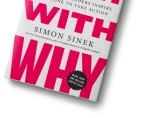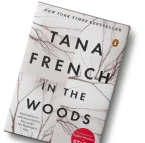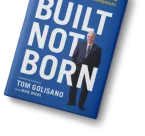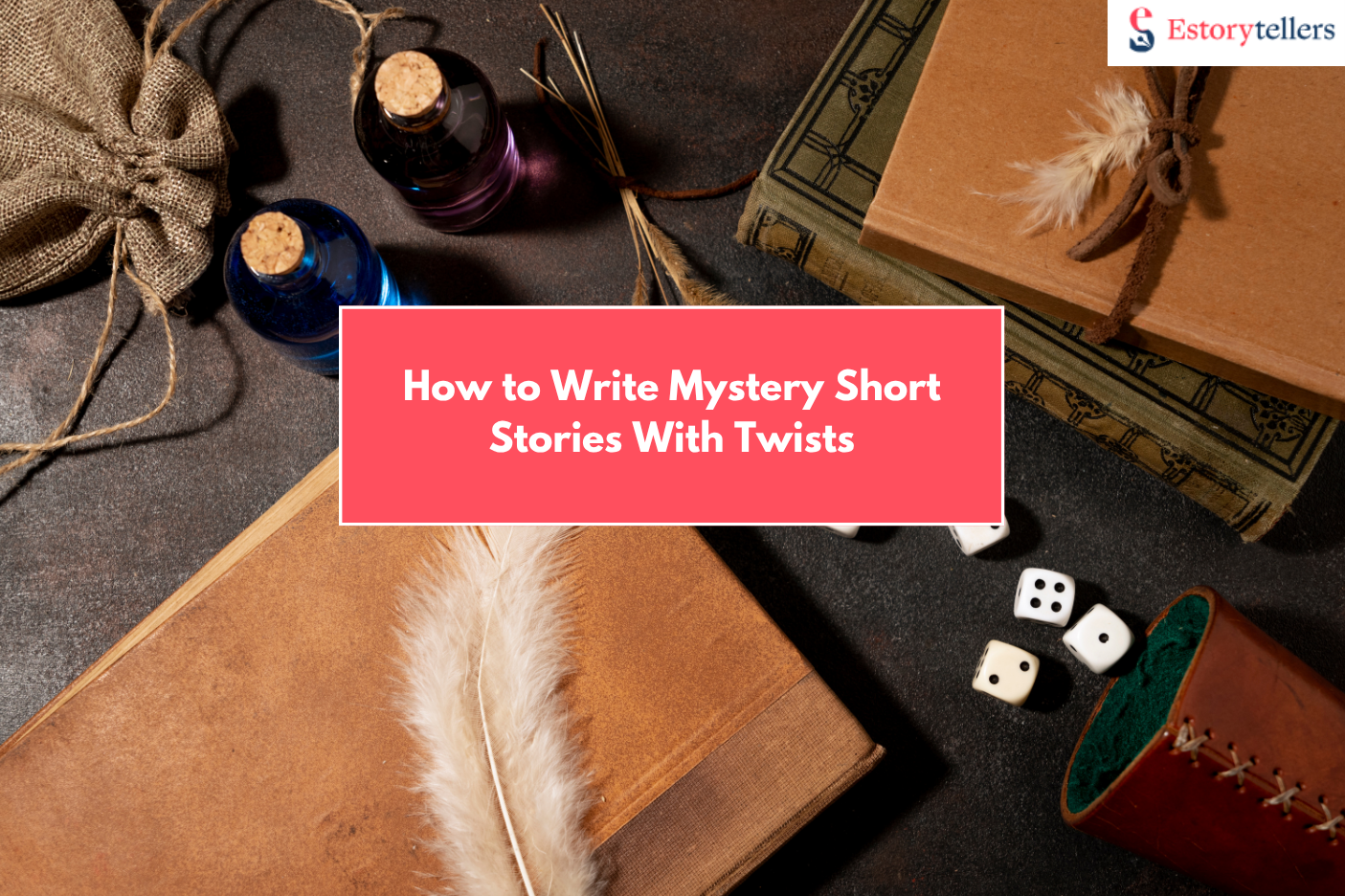
If you’ve ever wondered how to write a mystery story or wanted to try your hand at mystery story writing, the short form is a perfect place to start. Writing short mystery stories in 150 or 200 words challenges you to strip away excess and focus only on what matters—suspense, clues, and a clever twist. A short detective story doesn’t need multiple suspects or a sprawling setting; it thrives on a single puzzle, a tense atmosphere, and an ending that lingers. Think of it as a riddle told through fiction: compact yet powerful.
In this guide, we’ll explore how to write mystery short stories, common pitfalls to avoid, and provide examples of a very short mystery story (150 words) and another in 200 words. These bite-sized mysteries prove that even with few words, you can keep readers hooked and guessing until the final line.
As CEO of Estorytellers, I’ve worked with hundreds of writers to craft mystery shorts that land in anthologies, competitions, and classrooms. With this guide, you’ll get a perfect blend of art and structure plus insights that go beyond what you’ll find in most online blogs.
Got a Twisting Plot but No Time to Write?
Our ghostwriters specialize in mystery and thriller fiction. Let us craft your short story or novel from scratch.
What Makes a Good Mystery Story?
A mystery story isn’t just about hiding the truth—it’s about entertaining the reader with false leads before delivering a reveal that feels shocking yet logical.
Essential Ingredients:
- A central puzzle or crime: Theft, murder, disappearance, or something lighter like a prank.
- A detective figure: Could be a professional, an amateur, or even a child.
- Clues: Some obvious, some subtle.
- Red herrings: Misleading hints that keep readers guessing.
- A twist ending: The “aha!” moment that makes the journey worthwhile.
Pro Tip: If you want to master mystery story writing, always ask: “Will my ending surprise the reader while still making sense?”
How to Write Mystery Short Stories
- Open with a Hook
Begin with something strange or unsettling. Example: “When Rohan opened his locked drawer, the missing diary was inside—with a new entry written last night.” - Introduce Few but Clear Characters
Keep your cast small. A protagonist, one or two suspects, maybe a sidekick. More characters = more confusion in short formats. - Lay Down the Clues
Mix physical evidence (like fingerprints) with subtle cues (like nervous behavior). Hide the real clue between two fake ones. - Add Red Herrings
Make readers think they’ve solved it. Maybe the neighbor looks guilty but actually isn’t. - Reveal With a Twist
Endings should feel inevitable but not predictable. A neat trick is to reveal that the detective missed something obvious until the very end.
Short Detective Story Example (200 Words)
Here’s an original short mystery story (200 words):
Inspector Rao studied the shattered glass near the broken window. A burglary, the maid insisted. Jewelry gone, house ransacked.
But Rao frowned. “Why is the glass outside the house, not inside?”
The maid stammered. “I… I don’t know.”
Later, he noticed the family portrait. Dust covered every frame—except one spot where a photo was missing.
“Strange choice for a thief,” Rao murmured.
When the owner returned, Rao asked, “Who was in that missing photo?”
The man hesitated. “My brother. We don’t speak anymore.”
Rao smiled. “Then I know who took the jewels.”
The window break was staged. The brother had used his own key, stolen the valuables, and ripped out his photo so he wouldn’t be remembered.
The maid gasped. The case was solved in minutes.
A Very Short Mystery Story (150 Words)
For those searching “write a mystery story in 150 words” or “a very short mystery story (150 words),” here’s a compact example:
At dawn, Neha found muddy footprints in her locked kitchen. Only she had the key.
Her husband said it was nothing, but Neha knew the prints were small—like a child’s. They ended at the refrigerator, where a sticky note read: “You forgot me.”
She froze. Their daughter had died last year.
That night, the prints appeared again. This time, they led to the bedroom mirror. Written across the glass in steam: “I’m still here.”
Neha realized the truth: someone was inside the house, playing on her grief. But who?
The answer was staring back at her—from her husband’s reflection, holding a marker.
Dreaming of Writing the Next Big Whodunit?
Our team of expert fiction writers can turn your idea into a gripping mystery short story or novella.
Let’s Write It TogetherStep-by-Step: How to Write a Mystery Short Story
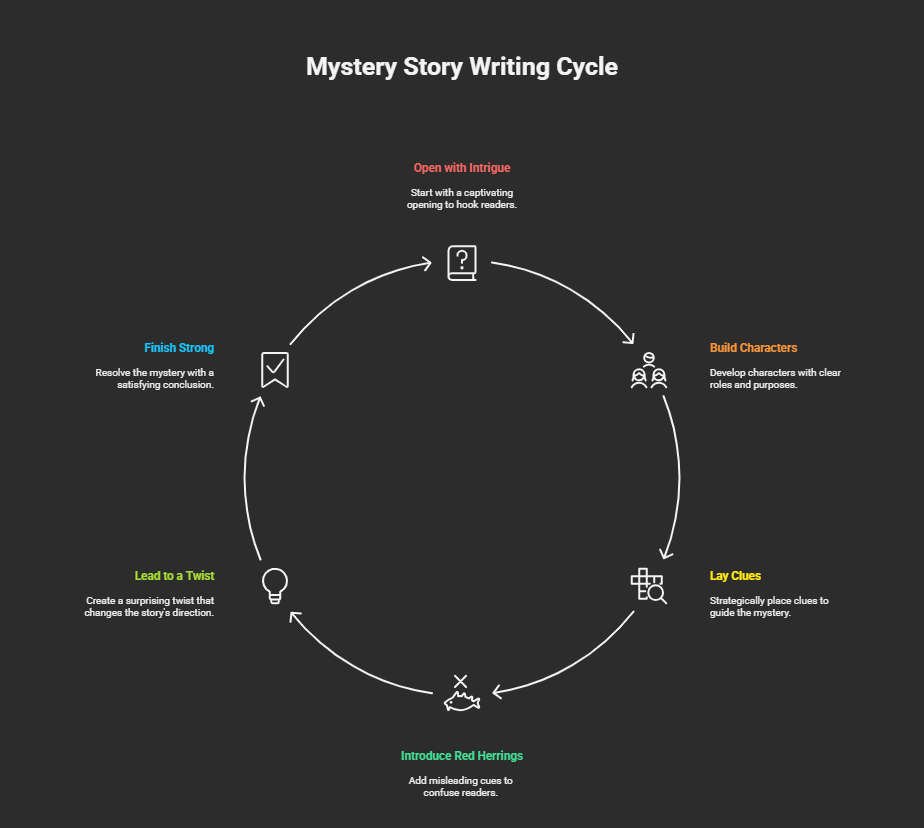
Writing Mystery Fiction Is an Art
Struggling to build suspense and plot twists? Hire a pro ghostwriter who knows the genre inside out.
Mystery Short Story Outline Template
Here’s a professional structure we use at Estorytellers:
- Hook (1–2 paragraphs)
- Introduction of characters & setting
- Discovery of the mystery
- Clues + 1-2 red herrings
- Rising tension / Investigation
- Twist / Reveal
- Resolution
This format works for stories ranging from 500 to 3,000 words.
Writing a Mystery Short Story for Kids
Short mysteries for kids should emphasize fun, curiosity, and light suspense. Avoid anything graphic or overly violent.
Key Tips:
- Use familiar settings: school, home, park.
- Include animals or magic for engagement.
- Simplify the plot: 1 mystery, 1 solution.
- Keep the language age-appropriate.
Example prompt:
A dog keeps barking at the attic door every night. When the kids finally open it, they find…?
Flash Fiction: Write a Mystery Story in 150 or 200 Words
This is where every word must serve a purpose. You can only have:
- One scene
- One central mystery
- One twist
Example (150 words):
Everyone believed the fire started from the kitchen. But Lily knew what she’d seen—the candle in the attic window, lit after midnight. The cops found no one. The attic was locked from inside. The only person with a key? Her sister, presumed dead last fall.
Estorytellers often helps writers edit and polish these tiny tales for microfiction magazines and contests.
Have the Clues but Need the Story?
Our creative writers can piece together your ideas into a suspenseful mystery that readers won’t put down.
Writing Short Mystery Stories in 150–200 Words
Short mystery stories in 150 or 200 words may sound limiting, but the restriction forces precision. A good short detective story usually focuses on:
- One scene – Imagine a single locked room, a coffee shop table, or a dark street corner. This makes the pacing crisp.
- One puzzle – Don’t overload with subplots. Perhaps it’s a missing watch, a coded note, or a broken lock.
- One reveal – Your twist ending should feel both surprising and inevitable.
These boundaries give you the freedom to focus on atmosphere and detail, rather than complex plotting. It’s a great exercise for beginners wondering how to write a mystery short story.
Tips for Mystery Story Writing
If you’re planning to write a mystery story that’s compact yet gripping, try these techniques:
- Keep it tight – In short mystery stories of 200 words or less, every sentence must serve the story. Skip backstory; start close to the action.
- Clues from the ordinary – A coffee stain, a misplaced ring, or the sound of a dripping faucet can be loaded with meaning.
- Mood over plot – When word count is short, tension is created through shadows, silences, and odd details more than lengthy explanation.
- Check the twist – A clever ending should still connect to the clues you planted earlier. Reread and ask: “Did I play fair with the reader?”
This approach makes your mystery story writing both engaging and replayable.
Short Or Long Form, Editing Matters: Top 5 Fiction Book Editing Services to Help You Perfect Your Novel
Common Mistakes to Avoid in Short Mystery Stories
Writers new to short forms often stumble into these traps:
- Too many characters – In 150 words, even two strong characters can feel crowded. Keep it simple: a detective and a suspect, or a narrator and an object.
- Predictable endings – If the twist feels obvious, readers lose interest. Subvert expectations, but in a logical way.
- Overly brilliant sleuths – Avoid detectives who “magically” know everything. Instead, let the solution come from a clever observation or a slip-up.
- No emotional weight – Even the shortest story should make readers care. Stakes can be personal: a lost heirloom, a friendship on the line, or a secret exposed.
By avoiding these mistakes, your short mystery stories become memorable instead of forgettable.
Mystery Writing Tools & Prompts
Online Tools:
- Scrivener or Dabble for outlining
- ProWritingAid for grammar
- Milanote for visual character boards
Prompts:
- A locked room with no door.
- A message hidden in a recipe.
- A camera with one missing photo.
Don’t Let That Killer Idea Go Unwritten
We turn mystery concepts into polished manuscripts ready for publishing. Fiction ghostwriting made simple.
Final Thoughts:
Writing a mystery short story is like creating a literary puzzle. You build intrigue, plant clues, and surprise your reader—all in limited space. But done well, it can leave a lasting impression far beyond its word count.
If you want professional guidance or hands-on help transforming your idea into a gripping short story, reach out to Estorytellers. No matter if it’s a 150-word micro-mystery or a 3,000-word masterpiece, we’ll make your story truly unforgettable.
FAQs
Q1: What’s the ideal word count for a mystery short story?
Anywhere from 500 to 3,000 words. Flash fiction is typically 150–500 words.
Q2: Can you write a mystery short story in 150 words?
Yes. Use minimalist storytelling—focus on atmosphere, suggestion, and twist.
Q3: How do I write a mystery short story for kids?
Use simpler plots, humorous situations, and light stakes (lost toys, school secrets).
Q4: Can Estorytellers help me write or edit a mystery story?
Absolutely. We specialize in mystery fiction for all formats—from ghostwriting to publication-ready edits.







